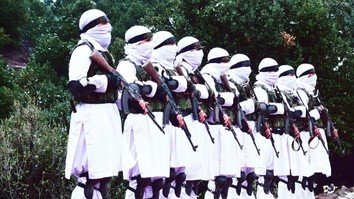Pro-al-Qaeda media outlet Al-Bayan posted messages on social media last week promoting multiple Taliban media channels, underscoring worries that the Afghan group maintains ties with the international terrorist organisation.
Al-Bayan's Telegram account posted a message on June 14 urging users to follow the Taliban's official Telegram account and its corresponding official account on Twitter.
The account used the hashtag "support jihadist media" on the post.
Al-Bayan, which is the hub for al-Qaeda material, posted the same message on its websites that day.
The posts comes amid ongoing peace efforts between US Special Representative for Afghanistan Reconciliation Zalmay Khalilzad and the Taliban.
A potential deal would see America agree to withdraw its troops after more than 17 years in Afghanistan, in return for the Taliban guaranteeing the country never again becomes a safe haven for terror groups, as was the case with al-Qaeda before the attacks on September 11, 2001.
The Taliban has yet to give such assurances.
Al-Qaeda–Taliban ties
The terrorist group and the Taliban have long maintained ties.
After the Taliban took over Kabul in 1996, al-Qaeda leader Osama bin Laden found Afghanistan a hospitable place to build his terrorist network and to create training bases for his followers.
The Taliban agreed to host him and his foreign fighters, hoping they would help the newly emerged movement take over the rest of the country, where the Northern Alliance was in control.
Sharing the same ideology, bin Laden provided valuable financial assistance to the Taliban. He also gathered support for the Taliban among sympathisers of al-Qaeda in Arab countries, strengthening the alliance.
In another example of Taliban–al-Qaeda co-operation, Ahmad Shah Massoud, a Northern Alliance leader, was assassinated by two al-Qaeda members pretending to be journalists at the instigation of the two groups two days before the September 11, 2001, attacks.
It was the Taliban's refusal to hand over al-Qaeda members, including bin Laden, that led to the US-led invasion of Afghanistan in October 2001 and the end of the Taliban regime. Bin Laden was killed on May 2, 2011, in Pakistan in an operation conducted by US Navy commandos.
Continued allegiance
Links between the two groups have continued even after the overthrow of the Taliban.
In June 2016, al-Qaeda leader Ayman al-Zawahiri, in an online audio message, pledged allegiance to Mullah Haibatullah Akhundzada, who took over the Taliban leadership after an air strike killed his predecessor Mullah Akhtar Muhammad Mansoor in Pakistan. Mullah Mansoor was travelling from Iran at the time.
Al-Zawahiri expressed his grief over the death of Mullah Mansoor as he pledged allegiance to his successor.
"As the emir of the al-Qaeda jihadist group, I present our allegiance to you," al-Zawahiri said, according to CNN.

![Al-Qaeda leader Ayman al-Zawahiri can be seen next to the Taliban's logo. [File]](/cnmi_st/images/2019/06/19/18575-alqaedataliban-585_329.jpg)







The U.S. is not what it used to be and is incapable of continuing the war. This [article] is all nonsense. With the help of the Almighty God, the United States will be eventually defeated and forced to leave the homeland.
Reply1 Comment